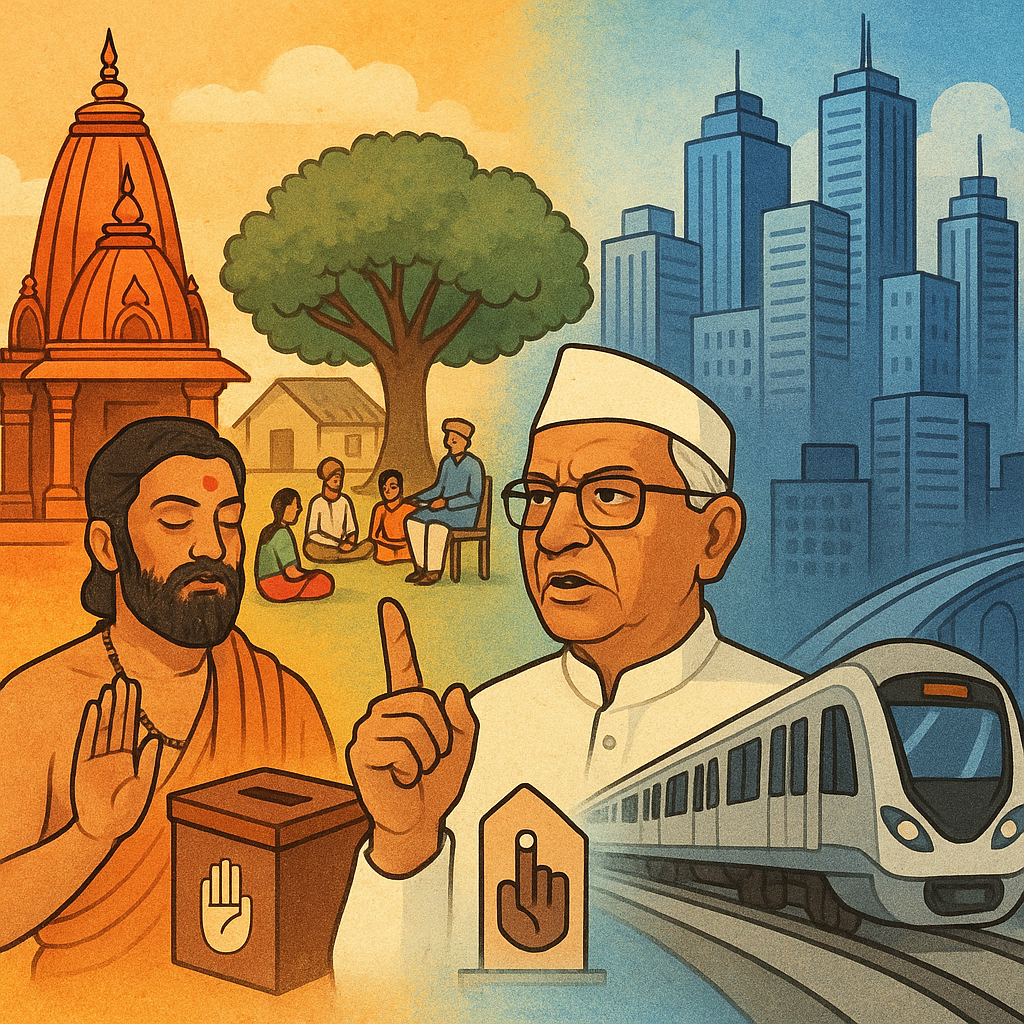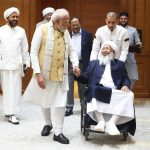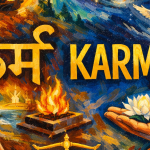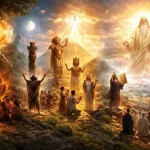Religion and Politics in Local Governance: From Panchayats to Metros
Religion and politics have always shared a complex relationship in India. While the Constitution envisions a secular state, the realities of faith-based identities often influence decision-making — from the smallest village panchayat to large metropolitan municipalities. In recent years, as grassroots democracy deepens and urban governance expands, religion’s presence in local governance has taken new and subtle forms. It no longer manifests only as overt symbolism or political rhetoric but also in policies, resource distribution, and social representation.
The Panchayat: Faith at the Grassroots
In rural India, religion is not an external force — it is woven into daily life and local governance. Village panchayats, the first tier of democratic administration, often function within a cultural landscape deeply shaped by faith traditions. Temples, mosques, gurudwaras, and local shrines are not just religious centers but also informal spaces for community dialogue and conflict resolution.
Although panchayats are constitutionally secular, religious beliefs influence decisions such as choosing dates for village meetings, managing temple lands, or organizing community welfare programs during festivals. Leaders often use faith symbols to gain social legitimacy — for example, sponsoring religious events, temple renovations, or Eid gatherings. These gestures can bridge community divides but also risk reinforcing group identities in governance.
At the same time, positive examples abound. In states like Kerala and Rajasthan, some panchayats have successfully integrated religious diversity into civic life — promoting interfaith festivals, ensuring equal support for all places of worship, and using temple revenues for public welfare. In such cases, faith becomes a unifying rather than divisive tool.
Urbanization and the Rise of Faith-Based Politics
As governance scales up from villages to towns and metros, the role of religion in politics becomes more visible and strategic. City leaders and municipal corporations often face the challenge of balancing religious sensitivities with urban planning. Issues such as loudspeaker use, festival processions, encroachment around shrines, or land allocation for religious structures frequently spark debates in city councils.
In metros like Mumbai, Delhi, and Hyderabad, religion intersects with governance through questions of zoning, heritage conservation, and public order. Local politicians, aware of the emotional power of religion, sometimes leverage it to build vote banks. Religious events — from Ganesh Chaturthi pandals to Eid fairs or Christmas carnivals — often receive municipal backing, blurring the line between cultural celebration and political patronage.
Yet, urban India also showcases examples of secular collaboration. Cities like Bengaluru and Pune have experimented with interfaith initiatives that bring religious leaders together for civic causes — from cleanliness drives to vaccination campaigns. Here, faith becomes a civic partner rather than a political instrument.
Temple Trusts, Waqf Boards, and Local Administration
An important intersection of religion and governance lies in the management of religious endowments — Hindu temple trusts, Muslim Waqf boards, and other faith institutions that own vast land and resources. These bodies, though religious in nature, operate under state oversight and interact closely with local administrations.
Disputes over property rights, transparency, and political appointments often draw these institutions into governance debates. In cities like Varanasi, Chennai, and Jaipur, temple trusts have collaborated with local authorities for heritage conservation and tourism development. Meanwhile, Waqf boards play a key role in social welfare projects, from education to healthcare, often filling gaps left by government services.
However, concerns about politicization persist. The appointment of trustees or administrators aligned with ruling parties sometimes leads to accusations of favoritism. This blending of faith and power highlights the thin line between religious autonomy and political influence in India’s governance system.
Faith, Festivals, and Public Spaces
One of the most visible intersections of religion and politics in local governance is the use of public spaces. Streets, parks, and community halls often become contested zones during religious festivals. Managing traffic, security, and noise during major events requires sensitive governance that respects religious freedom while maintaining civic order.
Many municipal bodies now approach these issues through inter-religious consultation committees, ensuring all faith groups are heard before making policy decisions. Such mechanisms promote mutual respect and prevent communal tension — a critical step in pluralistic societies.
At the same time, some politicians use these festivals for public visibility, sponsoring processions or using religious imagery to build influence. This can sometimes overshadow governance priorities like waste management or urban planning. The challenge, therefore, lies in balancing faith-based engagement with civic responsibility.
Women, Dalits, and Minorities: Shifting Power at the Local Level
Religion’s influence in local governance is also linked to caste and gender hierarchies. In many villages, temple committees and panchayat bodies overlap socially, leaving marginalized groups underrepresented. The introduction of reservations for women and Scheduled Castes/Scheduled Tribes in panchayats has begun to challenge this structure.
Women sarpanchs and minority leaders are increasingly redefining local power — emphasizing development over religious identity. Their leadership reflects a broader cultural shift: that faith, while integral to Indian society, should not dictate civic priorities. Grassroots democracy is slowly finding balance between belief and public service.
The Metros: Secular Spaces or Symbolic Politics?
In metropolitan India, the relationship between religion and governance has become both symbolic and strategic. Politicians often attend religious gatherings to signal inclusivity, while civic bodies grapple with religious sensitivities in infrastructure projects — from road expansion near shrines to heritage conservation of old churches or mosques.
Urban governance has also begun integrating spirituality into wellness and community programs — organizing yoga events, peace prayers, or interfaith dialogues. While some see this as cultural inclusivity, others argue it risks merging state functions with religious sentiment. From rural panchayats to sprawling metros, religion continues to shape the texture of Indian local governance. It influences leadership legitimacy, community engagement, and even policy priorities. Yet, the country’s democratic framework ensures that no single faith dominates the public sphere.
India’s challenge — and opportunity — lies in turning faith from a tool of political division into a source of civic unity. When religion inspires honesty, service, and compassion in governance rather than partisanship, it strengthens democracy at its roots. Whether in a small village meeting or a metro council hall, this balance between belief and responsibility defines the true spirit of Indian local governance.
~Religion World Bureau










